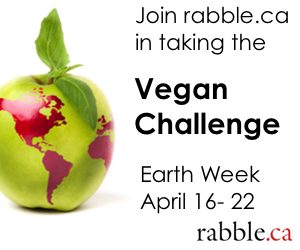The other day I decided to investigate the contents of commercial bottled salad dressing.
It’s not exactly a vegan issue, but I think it is important.
A friend who uses these bottled products says she has to because she “eats a lot of salad.”
Maybe.
But there is a case to be made that making good salad dressing in your own kitchen can be ridiculously simple.
The fact is that I have never found any of these bottled products, from Kraft to Paul Newman, to be even slightly appealing.
Partly, that is the result of our lifetime habit — mine and my wife’s — of always making our own dressing.
Years ago, we made our standard, daily dressing with vegetable oil and either red wine vinegar, white vinegar or cider vinegar.
Later on, we switched to olive oil, and, at one point (with the rest of the world), we discovered balsamic vinegar.
More recently, we tend to use only (or mostly) lemon juice, rather than any kind of vinegar. I like to add a drop of white wine vinegar, but my wife says she has lost her taste for vinegar, so I only do it when she is not looking.
Normally, these days, our salad dressing is extremely basic and simple — but still very good. It consists of crushed, fresh garlic, fresh-ground black pepper, sea salt, olive oil and lemon juice. I will sometimes add a pinch of dry mustard, and, rarely, a drop of white wine vinegar, and that’s it, that’s all.
We keep the dressing in a glass cruet, in the fridge, and sometimes, when it gets low, stretch it by adding oil and lemon juice.
As for the salads: for us, they are mostly about lettuce — but never the (supposedly) pre-washed, clear plastic-packaged kind. We wash and spin our own lettuce, which could be any combination of romaine, radicchio, watercress, leaf lettuce, Belgian endive and other varieties as they become locally available.
We are suspicious of the above-mentioned prepackaged, supermarket salads. There have been ominous warnings about the high fecal bacteria content of these (to us redundant) ‘convenience’ products.
If you must use them, please wash them well before eating them, even if the supermarket claims they have been washed.
In our house, salads almost never include carrots, celery, scallions, shallots or cucumber. We serve those separately — and, in the case of carrots, more often cooked than raw.
We do, however, add tomato, avocado and sweet pepper (red, yellow or orange) to the lettuce, and — on rare occasions, to dress up the salad — toasted pine nuts.
Dressed with our ‘house dressing’ (which we pretty much always have on the go) it seems to work for us.
Together with cold lentils, or chickpeas, or some other legume such as red beans or white kidney beans (in Italian: ‘cannellini’), and bread or cold noodles, the salad thus dressed makes a fine lunch — which, by sheerest luck, happens to be vegan.
As for my detective work on the contents of commercially bottled dressings: I conducted it at our local Metro store, in Ottawa’s near West End.
I looked at the labels of three kinds of commercial, bottled dressing: Kraft, the Metro house brand and Paul Newman’s brand, and found they all contain very similar ingredients. All defy the rule that says “if you can’t pronounce it, don’t eat it!”
Among the dubious ingredients you consume when you splash these chemical concoctions on your salad are: potassium sorbate, polysorbate 60, phosphoric acid (which Kraft obligingly explains “enhances tartness”), silicone dioxide (to “prevent separation”, again according to the helpful folks at Kraft), as well as good old sugar (refined and white, no doubt) and cornstarch.
Why anyone would ever add cornstarch to a salad is quite beyond me. We use a bit of cornstarch in a stir-fry to thicken the sauce. But who wants their salad dressing to be gloppy and sticky like a stir-fry sauce?
And why these companies add sugar to their dressing (they all do) and then add some obscure chemical to “enhance tartness” defies all logic.
But logic is not what these products are all about. They are the triumph of consumerism over taste, health and common sense.
A friend has a late model Cadillac, the nifty features of which include the fact that the car almost closes the door for you. You give the Cadillac’s door a slight push and the car takes care of the rest. If you pay for a sense of luxury, that is the sort of thing you get. Now, hands up those who have found closing a car door to be something of an arduous task. As expected: no hands. This self-closing door is a case of creating a redundant sense of convenience, and getting buyers to pay dearly for it.
It’s the same story for bottled salad dressing, whether big corporate Kraft or supposedly do-gooder Paul Newman. These products provide a bogus sense of ‘convenience’ but they are hardly time-savers when you consider that one can prepare homemade salad dressing in two or three minutes. Worse, all of the bottled dressings foist a whole host of dubious chemicals on consumers. The companies will say they are harmless additives. Can they be sure? Can consumers be sure?
Enough said.
My vegan challenge is also a health, taste and good sense challenge: Don’t be suckered by corporate food conglomerates. Make your own salad dressing.



